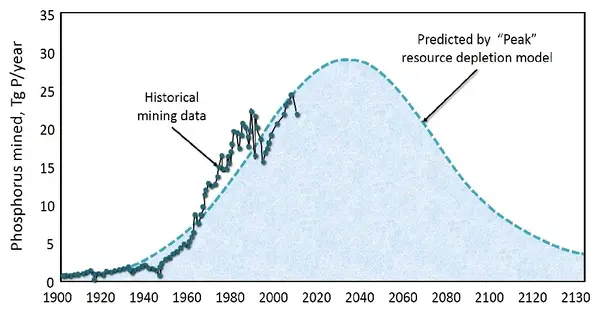Peak phosphorus is a term used to indicate the point in time when mankind has reached its maximum global production rate of phosphorus as an industrial and commercial raw material. It refers to the period in time when global phosphorus output, which is critical for agricultural and food production, hits its peak and begins to fall. The term is used in the same way as the more commonly used term “peak oil.” Phosphorus is an important fertilizer component that influences plant growth and development. As the world’s population grows, so does the demand for phosphorus for agricultural uses.
The subject was highlighted as a debate on whether phosphorus shortages would be impending around 2010, which was mainly ignored after USGS and other institutions improved world estimates on accessible phosphorus resources, mostly in the form of extra supplies in Morocco. However, the actual reserve quantities remain unknown, as do the potential effects of greater phosphate use on future generations. This is significant since rock phosphate is a major component in many inorganic fertilizers. As a result, a rock phosphate scarcity (or even significant price hikes) might have a catastrophic impact on global food security.
The issue about peak phosphorus stems from the limited availability of phosphorus supplies. Unlike nitrogen, which is abundant in the atmosphere, phosphorus is mostly derived from phosphate rock deposits. These resources are confined in a few nations, and extracting phosphorus from these rocks requires a significant amount of energy.
Phosphorus is a finite (limited) resource found in the Earth’s crust and living creatures, however it is relatively scarce in concentrated forms that are not evenly distributed around the planet. Phosphate rock mining is the only cost-effective production method currently available, although only a few nations have sufficient commercial deposits.
Some experts have raised concerns that as these finite phosphate rock reserves are depleted, the cost of extracting phosphorus could increase, leading to potential supply shortages and higher prices. Additionally, the environmental impact of phosphate mining, such as habitat destruction and water pollution, adds to the urgency of finding sustainable solutions.
Morocco (including reserves in Western Sahara), China, Egypt, Algeria, and Syria rank first through fifth. Future production estimates vary greatly based on models and assumptions about extractable volumes, but it is unavoidable that Morocco will have a considerable impact on phosphate rock production in the foreseeable future.
Peak phosphorus is related to peak oil, which refers to the point at which world oil output peaks and begins to fall. Both emphasize the difficulties associated with the scarcity of critical resources and the necessity for sustainable practices to secure food security and environmental conservation.
















